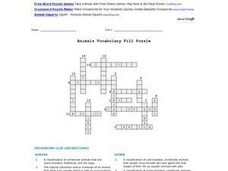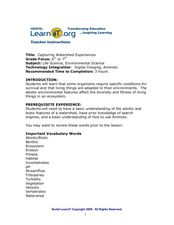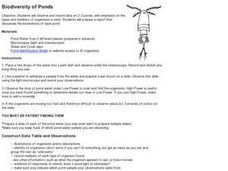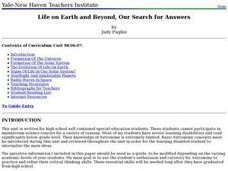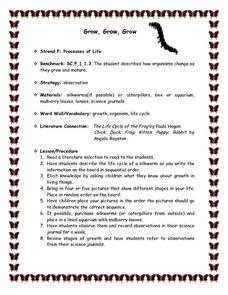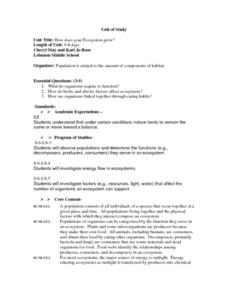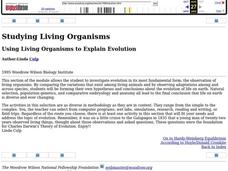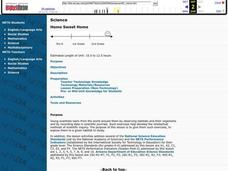Curated OER
Animals Vocabulary Fill Puzzle
In this science worksheet, students figure out the answers to 15 clues going across and down associated with vertebrate animals. Students fill in a crossword puzzle.
Curated OER
Biology: living Things and their Environment
Students recognize that organisms depend on other organisms. In this organism lesson, students understand symbiotic relationships and competition. Students explain food chains and food webs. Students understand that change is always...
Curated OER
Desert Adaptations
In this desert adaptations worksheet, students are given a water filled sponge which represents an animal. Students observe their "animal" for a 24 hour period and conserve the water in the sponge as best they can. They measure and...
Curated OER
Capturing Watershed Experiences
Students observe organisms found in the water. In this lesson on organisms, students collect water from local streams and tributaries in order to study the organisms found in the water. As a culminating activity, students create a...
Curated OER
Biology Trivia Questions
Students answer 71 questions about a variety of topics in biology. For this biology trivia lesson plan, students use the internet to find the answer to questions about the systems of the body, their structures and functions, the...
Curated OER
Biodiversity of Ponds
Students study the biodiversity in pond water. In this biodiversity lesson plan, students observe 3 samples of pond water using a pond water identification sheet. They record their findings and identify the organisms they find, the...
Curated OER
Scale of Organisms
In this scale worksheet, students use the SI system to compare the sizes of some of the smallest and largest organisms on Earth. This worksheet has 7 problems to solve.
Curated OER
Dissection Webquest
In this dissection webquest, students research information on the internet about dissections. Students compare the 4 websites to note differences in the definitions, explanations, and graphics presented of the term dissection. Students...
Curated OER
Moon Crash
In this moon crash worksheet, students research information about the moon. In a given scenario, students decide which emergency supplies to take in order to survive on the moon.
Curated OER
Life Cycle: Diversity in a Balance 4th Grade Workbook
In this life cycle workbook, 5th graders examine plant and animal cells, classification of organisms, human biology, photosynthesis, and natural environments. 21 different activities make up the Life Cycle Workbook.
Curated OER
Classification of Organisms
In this classification learning exercise, students solve 3 classification riddles, complete 6 true and false questions, complete 4 sequences, and solve a riddle about the classification of an animal.
Curated OER
Marine Life, Oceans, Lakes and Rivers
Students examine the types of organisms found in oceans. In groups, they read articles about the research done at certain sites. They work together to research their own water ecosystems and report the findings to the class. To end...
Curated OER
Life on Earth and Beyond, Our Search for Answers
Students in a special education classroom are introduced to how the universe and solar system was formed. Using the internet, they research the characteristics of Earth that support human life. In groups, they compare and contrast...
Curated OER
Grow, Grow, Grow
Students listen to literature selection, describe life cycle of silkworm, discuss what they know about growth in living things, observe silkworms for one week and record observations in science journals, and review stages of growth.
Curated OER
Food Classification
Middle schoolers are introduced to classification and some of the difficulties surrounding classification and how classification systems need to be able to adapt and how they may need to be changed when new information is discovered. ...
Curated OER
Introducing the Use of Dichotomous Keys to Students
Students are introduced to the use of dichotomous keys as a simple means of beginning scientific observations in nature. They comprehend how to use a dichotomous key. Students distinguish characteristics of a group of organisms. They...
Curated OER
Salt Marshes And Their Inhabitants
Students investigate the ecosystem of the salt marshes. This is done in order to develop an appreciation for this type of environment. They conduct research using a variety of resources. Students are given samples of different organisms...
Curated OER
Needs of Living Things
Students discuss and explore the needs of living things. They choose to create a slide show with captions, create a web showing the needs of one Organism using KidPix. or make picture book by hand or using Microsoft Publisher.
Curated OER
How Does Your Ecosystem Grow?
Students consider that under certain conditions in nature tend to remain the same or move toward a balance. They observe populations and determine the functions (e.g., de-composers, producers, consumers) they serve in an ecosystem. They...
Curated OER
Classify the Microbes
Students classify microorganisms into categories based on their characteristics. Pupils use a taxonomic key to identify organisms. They classify certain bacteria, protists, and viruses using a classification or taxonmic key.
Curated OER
Pandemics and Epidemics
Students evaluate data related to population growth, along with problems and soultions: disease cvontrol. They are able to explain how changes in habitat may affect organisms. Students evaluate evolutionary theories and processes.
Curated OER
Using Living Organisms to Explain Evolution
Students investigate evolution in its most fundamental form: the observation of living organisms. By comparing variations that exist among living animals, students formulate their own hypotheses and conclusions about the evolution of...
Curated OER
Home Sweet Home
Students enjoy investigating and becoming aware of the habitats around them. They record their observations in scientific journals. Data collection can take the form of a simple drawing or taking digital photos or videos in the habitats...
Curated OER
Coral Reefs
Students research an inhabitant of a Caribbean coral reef using a list of common organisms that live on or near it. Students then write a description of their organism and draw a picture or a 3-D model of it. Eventually they all work...


